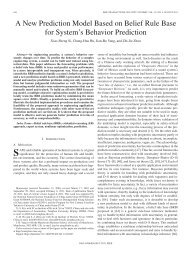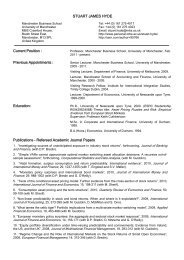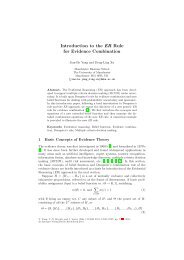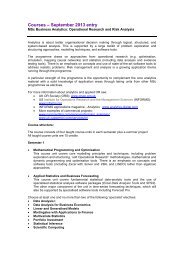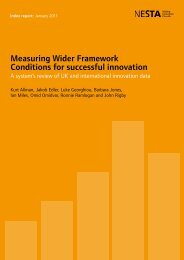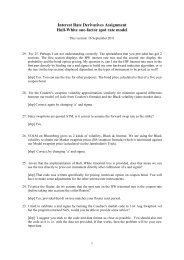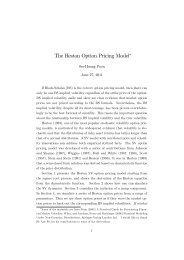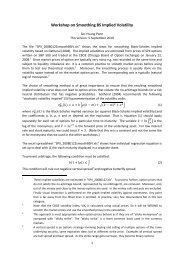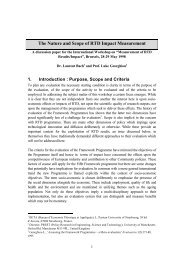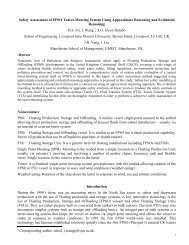Manchester Institute of Innovation Research ANNUAL REPORT ï²ï°ï±ï±
Manchester Institute of Innovation Research ANNUAL REPORT ï²ï°ï±ï±
Manchester Institute of Innovation Research ANNUAL REPORT ï²ï°ï±ï±
You also want an ePaper? Increase the reach of your titles
YUMPU automatically turns print PDFs into web optimized ePapers that Google loves.
sustainability challenge, and the social and economic transformations that accompany<br />
them. In short, the research scope <strong>of</strong> this theme can be characterised as the relationship<br />
between innovation and sustainable development where: innovation is understood, in the<br />
neo-Schumpeterian tradition, to include the development and implementation <strong>of</strong> new<br />
product and process technologies, new services, new forms <strong>of</strong> organisation (including new<br />
business models and processes), new markets and industries; and, sustainable<br />
development is understood in its broadest sense to involve the three pillars <strong>of</strong><br />
environment, society and economy.<br />
During 2011, we continued to develop a programme <strong>of</strong> work in this area which is organised<br />
into three broad themes:<br />
1. System dynamics and transformation: How do innovation systems form to solve<br />
sustainability problems and how do they evolve How are markets and sectors<br />
restructuring Is there any evidence <strong>of</strong> new forms <strong>of</strong> economic governance<br />
2. Eco-innovation management and policy: To what extent and how are firms changing<br />
their business models and innovation strategies in response to the sustainability<br />
challenge To what extent are product / service interdependencies shifting within these<br />
new business models What is the role <strong>of</strong> government policy (regulations, intellectual<br />
property regimes, subsidies, support mechanisms etc.) in stimulating innovation<br />
systems towards the goals <strong>of</strong> sustainable development<br />
3. Demand, consumption and social mobilisation: How might the co-evolution <strong>of</strong><br />
innovation and consumption contribute to sustainability objectives How can new<br />
socio-technical infrastructures help to shift consumption behaviour What are the<br />
processes <strong>of</strong> social mobilisation around the sustainability agenda and how do these<br />
relate to innovation (Links to the Sustainable Consumption <strong>Institute</strong>:<br />
www.sci.manchester.ac.uk/ and the ESRC co-funded Sustainable Practices <strong>Research</strong><br />
Group: www.sprg.ac.uk)<br />
Our research activities involve sector analyses, cross-cutting (i.e. non-sector specific)<br />
analyses and conceptual, theoretical and methodological work. We have developed strong<br />
interests in the construction, bio-energy, nanotechnology, aviation, water and food sectors.<br />
2011 has seen a number <strong>of</strong> notable developments in the activities associated with the<br />
Sustainability and <strong>Innovation</strong> theme, including:<br />
The appointment <strong>of</strong> Dr Nicola Spurling as research associate to work with the ESRC/<br />
Defra/Scottish Government funded Sustainable Practices <strong>Research</strong> Group.<br />
A series <strong>of</strong> publications looking at the emergence <strong>of</strong> bioenergy and in particular<br />
bi<strong>of</strong>uels from recent research by theme members (Boucher, Gee, Gough, Upham,<br />
McMeekin) in Energy Policy, Industry and <strong>Innovation</strong>, Greenhouse Gases: Science<br />
and Technology, Open Geography Journal, Environmental Science and Policy. Dr<br />
Paul Upham has spent 2011 as Visiting Pr<strong>of</strong>essor at the Finnish Environment<br />
<strong>Institute</strong> in Helsinki to work on bi<strong>of</strong>uel innovation policy.<br />
We held focused meetings with the outgoing and incoming CEOs <strong>of</strong> Tesco to discuss<br />
our research on how large firms can use their buying power to stimulate supply<br />
chain eco-innovation.<br />
9



